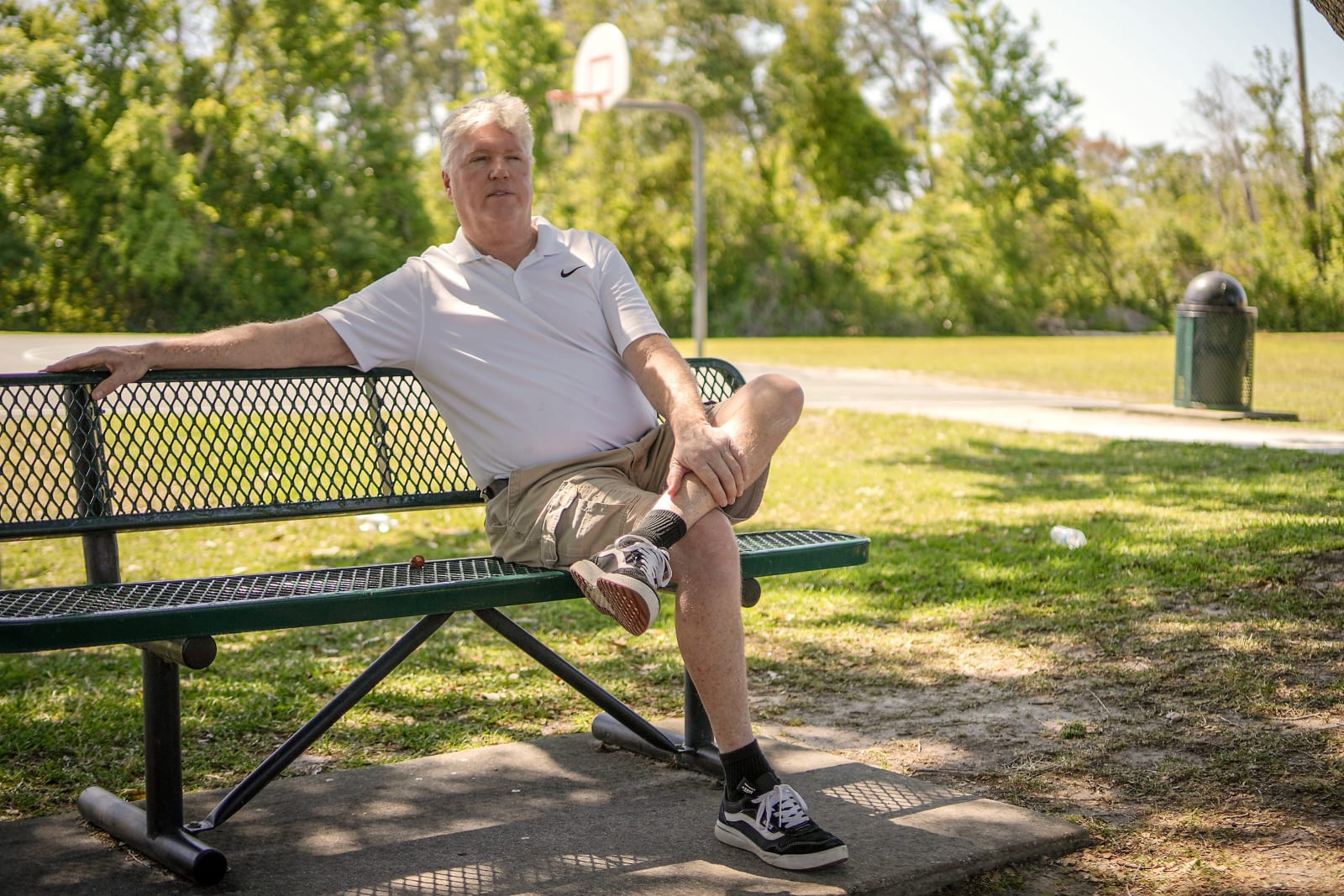On Christmas Day, as they were at the WaTiki indoor water park, Hans Wirt found himself growing tired while climbing the steps with his son towards the waterslides.
Once they got back to the nearby hotel where Wirt and his girlfriend were staying during their visit with relatives in Rapid City, South Dakota, Wirt’s breaths grew increasingly heavy.
He then felt sick and turned pale. Wirt suspected that the reason could be the difference in elevation between his house in Deltona, Florida — which sits at 33 feet above sea level — and Rapid City, located near the border of the Black Hills. However, his 12-year-old boy became concerned and requested an emergency medical vehicle.
I sensed from the expression in his eyes that there was an additional layer to this,” Wirt stated. “Thus, I am somewhat grateful to my son for rescuing me.
It transpired that the 62-year-old was experiencing a heart attack. “A terrible Christmas gift,” Wirt commented.
Medical staff got Wirt stable prior to transporting him to Monument Health, which is the sole hospital in Rapid City featuring an emergency department. There, he received treatment for two days.
Then the bill came.
The Medical Procedure
Paramedics employed a defibrillator to reinstate a regular heartbeat. Upon arrival at the hospital, doctors administered several medications to Wirt, utilized an electrocardiogram along with other diagnostic and monitoring equipment, and placed stents in his arteries to enhance blood circulation to his heart.
The Final Bill
The total amount was $95,523.73, with $32,998.90 allocated for medical supplies, primarily for stents, and $28,879 for procedures conducted in a cardiac catheterization laboratory. Following some undisclosed modifications made by the hospital to the invoice, Wirt’s outstanding debt amounted to $77,574.44.
The Challenge of Billing: Medicaid Beyond State Borders
Wirt is enrolled in Florida’s Medicaid program via Sunshine Health, which operates as a managed-care plan. However, the hospital in South Dakota declined to file the claim with his out-of-state Medicaid coverage, opting instead to directly charge Wirt and later threatening to hand over the unpaid balance to a collections agency.
Medicaid, which provides government-funded healthcare mainly to individuals with low income levels and those who have disabilities, receives funding from both national and state governments. The administration of this program lies with individual states, many of whom collaborate with private insurers such as Sunshine Health through contractual agreements.
Federal law
states that Medicaid programs at the state level are required to cover reimbursement for emergency healthcare services provided to beneficiaries in hospitals outside their home state.
Many hospitals bill out-of-state Medicaid plans in such situations. If they don’t, they risk not being reimbursed at all, since Medicaid recipients probably won’t be able to afford large bills, said Katy DeBriere, who was legal director for the Florida Health Justice Project when she spoke with KFF Health News in April.
However, there isn’t any national legislation mandating they must, she pointed out.
Federal
court opinions
have
noted that hospitals
are not required to bill Medicaid for every individual beneficiary they treat, even if they generally accept Medicaid.
Monument Health did not submit the billing to Wirt’s insurance since the facility is not registered as a healthcare provider with Florida Medicaid, according to hospital spokesperson Stephany Chalberg. In an interview with KFF Health News, she mentioned that Monument Health processes Medicaid plans exclusively for South Dakota along with four neighboring states: Wyoming, Montana, Nebraska, and Minnesota.
The hospital’s website says
Patients on Medicaid in those states who do not enroll “are liable for all costs.”
“A hospital spokesperson stated in an email to Wirt that because of the substantial credentialing needs for our various hospitals and numerous doctors, we aren’t affiliated with every state.”
Based on Florida’s Medicaid website
Out-of-state providers treating an enrollee must submit five documents to bill the program, which includes a detailed six-page application, a copy of their provider’s license, and a completed claim form.
The procedure varies across states, and numerous Medicaid programs pay out-of-state providers at reduced rates compared to their in-state counterparts.
according to
The Medicaid and CHIP Payment and Access Commission, a government body advising Congress.
More from this series
・
The Patient Anticipated a Complimentary Examination. The Invoice Amounted to $1,430. Apr 30, 2025
・
He had short-term health insurance. His colonoscopy bill totaled $7,000. Mar 28, 2025
・
A Jogger Was Struck by a Vehicle, Followed by an Unexpected Emergency Medical Service ChargeFeb 28, 2025
Provider enrollment hurdles put “beneficiaries in a difficult position, stopping them from obtaining the coverage they are rightfully entitled to,” according to Chalberg.
Wirt opted to file his claim with his Medicaid plan himself. However, Sunshine Health informed him that they could only accept submissions directly from healthcare providers.
Elizabeth Boyd, who speaks for Sunshine Health, informed KFF Health News that their team reached out to the hospital on Wirt’s behalf. When questioned about why the plan cannot handle bills submitted directly by patients and what additional steps could have been taken to assist Wirt, she chose not to reply.
The Resolution
A few days following the email sent by KHN to officials at Monument Health regarding this story, Wirt observed that his remaining balance dropped from over $77,000 to zero dollars.
Chalberg informed KFF Health News that Monument Health handled Wirt’s expenses via their charity care initiative. She mentioned that “eligible individuals” are made aware of this program and that every invoice undergoes an assessment before being forwarded to collection agencies to ascertain if the individual might be suitable for financial aid under their policies.
To keep their tax-free status, nonprofit hospitals must
must have programs
This offers free or reduced-cost care to individuals unable to cover their expenses.
However, Wirt mentioned that when he initially reached out to Monument Health following receipt of his invoice and stated he was unable to cover the cost, representatives did not bring up this assistance program. He recounted that when he enquired about external organizations that might assist with settling the bill, they provided no information regarding such resources. According to Wirt, hospital staff merely suggested establishing a repayment schedule; nonetheless, even these periodic payments remained unaffordable for him. “I’m on Medicaid for good reasons,” Wirt explained. “It escapes my understanding as to how they anticipate someone relying on Medicaid to gather such funds. This expectation seems utterly impractical.”
The Takeaway
Sarah Somers, the legal director of the National Health Law Program, stated that in Wirt’s case, the different “components of the Medicaid system” did not function properly. She added, “No one is making sufficient effort to simply facilitate things smoothly for this individual.”
Somers stated that states hold the primary responsibility for overseeing Medicaid and thus play a crucial role. She added that Medicaid managed-care organizations are likewise meant to step in.
Somers and DeBriere advised that Medicaid beneficiaries receiving invoices they believe are unjustified should lodge a complaint with their state’s Medicaid program as well as their managed-care plan, if applicable. Additionally, they suggested checking for the availability of a Medicaid or managed-care caseworker to assist them in advocating on their behalf.
The lawyers stated that patients ought to reach out to a legal aid clinic or a specialized consumer protection agency focusing on medical debts. DeBriere mentioned these entities can assist in lodging complaints and liaising with hospitals.
DeBriere stated that if she had helped Wirt, she would have promptly dispatched a letter to Monument Health instructing them to cease all billing activities. She also mentioned they should either enroll with Florida Medicaid to process his claim or provide him with charitable assistance.
Wirt mentioned that the physicians who attended to him and the healthcare provided at Monument Health were top-notch. He decided to speak up regarding the hospital’s charging methods as he aims to prevent others from going through a similar ordeal.
“If I fall ill and have a heart attack, I need to make sure I handle things here in Florida now rather than in another state,” he quipped.
This
article
first appeared on
KFF Health News
and is reproduced here under a Creative Commons license.

Related Articles:
・
‘Won’t and can’t back’: 12 GOP members deliver setback to Johnson’s legislation
・
‘Rage Mounts Over Trump’s Widespread Sacking of Health Staff Due to Incompetence and Arson Allegations’
・
The new book by Trump’s nephew introduces ‘an additional dimension’ to the ‘intricate and contentious familial drama’.
・
The parents of the baby get a monthly hospital bill of $45,843 for 12 months—even though they have insurance coverage.







